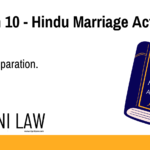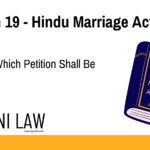Code: Section 13B of the Hindu Marriage Act, 1955
Section 13B of the Hindu Marriage Act, 1955, provides the legal framework for couples to dissolve their marriage through mutual agreement.
“Divorce by mutual consent.—
(1) Subject to the provisions of this Act, a petition for dissolution of marriage by a decree of divorce may be presented to the district court by both the parties to a marriage together, whether such marriage was solemnized before or after the commencement of the Marriage Laws (Amendment) Act, 1976 (68 of 1976), on the ground that:
- they have been living separately for a period of one year or more;
- they have not been able to live together; and
- they have mutually agreed that the marriage should be dissolved.
(2) On the motion of both the parties made not earlier than six months after the date of presentation of the petition referred to in sub-section (1) and not later than eighteen months after that date, if the petition is not withdrawn in the meantime, the court shall, on being satisfied after hearing the parties and making such inquiry as it thinks fit, and on verifying that a marriage has been solemnized and the statements in the petition are true, pass a decree of divorce declaring the marriage to be dissolved with effect from the date of the decree.”
—
Explanation of Section 13B – Mutual Consent Divorce
Section 13B allows a husband and wife to jointly file for divorce if both agree that the marriage has irretrievably broken down. This section was added by the Marriage Laws (Amendment) Act, 1976, to simplify the divorce process for couples who no longer wish to continue the relationship.
To qualify for divorce under Section 13B, three key conditions must be satisfied:
- The parties must have lived separately for at least one year.
- They must not be able to live together.
- They must mutually agree that the marriage should end.
Additionally, there is a mandatory “cooling-off period”:
- After filing the joint petition, the parties must wait at least six months before making a second motion.
- This second motion must be filed within eighteen months from the date of the initial petition.
- The court, after being satisfied with the facts and consent of both parties, may pass a decree of divorce.
The six-month waiting period is sometimes waived by courts in specific circumstances (based on recent Supreme Court rulings), but the standard statutory requirement remains unless waived by judicial discretion.
—
Illustration
Let’s look at some practical scenarios:
🟢 Example 1: Amicable Separation
A couple has been living apart for over a year. They mutually agree that the marriage should be dissolved and file a joint petition. After six months, they confirm their intent before the court, and the court grants a decree of divorce.
🟡 Example 2: Withdrawal of Consent
A couple files for mutual consent divorce, but one party changes their mind before the second motion. In this case, the divorce cannot be granted as mutual consent is withdrawn.
🔵 Example 3: Early Divorce
A couple files for mutual consent divorce and seeks to waive the six-month period citing urgency and irretrievable breakdown. The court, upon satisfaction, may allow early divorce by waiving the cooling-off period.
—
Common Questions and Answers on Section 13B
▶ Is mutual consent mandatory for divorce under Section 13B?
Yes. Both parties must agree to the divorce at the time of filing and at the second motion. Without mutual consent, the court cannot grant divorce under this section.
▶ Can one spouse withdraw consent after filing the petition?
Yes. Either party can withdraw consent any time before the final decree. In such cases, the mutual consent divorce will not be granted.
▶ What is the purpose of the six-month cooling-off period?
The law provides this time for reconciliation. It ensures that parties reflect on their decision and attempt reconciliation before ending the marriage permanently.
▶ Can the court waive the six-month waiting period?
Yes. Based on recent judgments (e.g., Amardeep Singh v. Harveen Kaur, 2017), courts may waive the six-month period if:
- All efforts at reconciliation have failed;
- The waiting period would only prolong the agony;
- The parties have settled issues like alimony and child custody.
▶ Is mutual consent divorce faster than contested divorce?
Absolutely. Mutual consent divorce is faster, less adversarial, and often concluded in a few months if there are no disputes.
—
Conclusion
Section 13B of the Hindu Marriage Act offers a simple and respectful way for couples to part ways when both agree the marriage is no longer working. It provides a legal structure that encourages amicable resolutions, while also ensuring the decision is thoughtful and not taken hastily.
Understanding this provision is essential for those seeking a peaceful and cooperative legal separation. If you need guidance on filing a mutual consent divorce or related matters, consult a qualified family law advocate.
For expert legal content and personalized advice, visit ApniLaw.









